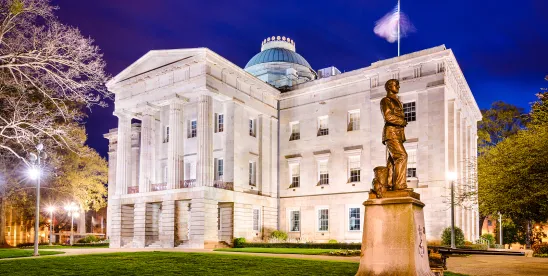UPCOMING EVENTS
April 22, 2025
NC Chamber Spring Member Roundtable – Asheville
April 24, 2025
RTAC – Association of Corporate Counsel Spring Reception – (Raleigh)
April 28, 2025
Thinkers Lunch: Rob Christensen
May 13, 2025
NC Chamber Business Summit on Mental Health
June 5, 2025
Triangle Business Journal 2025 State of Health Care in the Triangle
LEGISLATIVE NEWS
SENATE PASSES BUDGET PLAN
On Monday, the North Carolina Senate unveiled Senate Bill 257, their budget plan for state spending, which includes raising pay for teachers and state workers, advancing income tax cuts, and allocating funds for future Hurricane Helene recovery efforts. The GOP’s budget plan, spanning 440 pages, promises to cut out “waste” and “bloated” spending. The proposed budget for the next two years totals $32.6 billion for 2025-26 and $33.3 billion for the following year.
The budget designates $700 million for Hurricane Helene response and an additional $1.1 billion for the state’s “rainy day fund,” which could be used for more Helene aid or other expenses. This adds to the $1.5 billion already spent on recovery since the storm occurred six months ago.
Most state employees would receive a raise of 1.25% next year, along with $3,000 in bonuses over two years. Some employees in specific roles, especially correctional staff and law enforcement, would receive even larger raises with average increases set at 3.3% for teachers, 8.9% for correctional officers, 9.2% for Highway Patrol, and 14.4% for Alcohol Law Enforcement and SBI officers. The budget plan would include a review of state government spending, led by State Auditor Dave Boliek.
Other highlights from the proposal include:
- An overall increase in funding for health care, including sizeable investments in the Medicaid Contingency Reserve, reflective of Medicaid expansion.
- A $535.5 million investment in a new 500-bed pediatric hospital with UNC Health and Duke Health.
- $25 million to reinstate coverage of GLP-1 weight-loss drugs for certain state workers.
- Overhauls to NCInnovation’s funding model, asking for the return of $500 million the organization received from the state in 2023.
- Additional funds for teacher signing bonuses, mentorship programs, and initiatives to improve reading scores.
- Doubling the tax rate for sports betting operators from 18% to 36%.
- Allocating $3.5 billion over two years to the State Capital Infrastructure Fund, which finances construction initiatives at universities.
- Reducing the income tax rate to 3.49% in 2027 and 2.99% in 2028, with potential for further reductions.
- Increasing unemployment benefits to $400 per week.
- Establishing a fund for state veterans’ cemeteries within the Department of Military and Veterans Affairs.
- Restoring the “Rainy Day” reserves fund to $4.75 billion.
- Allocating $110 million for PFAS monitoring through the Department of Environmental Quality.
- Designating $1.5 billion in federal funds for rural broadband internet.
- Would Repeal the state’s Certificate of Need Law
The Senate passed the budget proposal on Thursday morning with a vote of 30-15, which included four Democrats voting with the Republican majority. The House is expected to release their proposed budget in May, with negotiations between the chambers following thereafter.
Read more by WRAL News (Doran) (4/15/25)
Read more by WRAL News (Doran) (4/17/25)
Read more by News & Observer (4/15/25)
Read more by News & Observer (4/16/25)
HOUSE PASSES REINS ACT
The North Carolina House of Representatives has passed House Bill 402, known as the "Regulations from the Executive in Need of Scrutiny (REINS) Act. " This bill increases legislative control over state agency rulemaking, requiring approval from the North Carolina General Assembly for any regulation with economic impacts over $1 million. The House passed the bill with a 68-44 vote, gaining support from all Republicans and one Democrat.
Representative Allen Chesser (R-Nash) stated that the bill makes lawmakers accountable for significant regulatory decisions, providing citizens with someone to hold responsible. “Right now, we’ve got over 110,000 regulations on the books in North Carolina, and almost 100% of them pass through our current system,” Chesser explained on the House floor. “Very few would cross this threshold to where it comes into our body, where we get to get to review it. What we’re saying is that the people should have someone to hold accountable, and that should be us.”
Bill sponsors in the North Carolina General Assembly claim the REINS Act increases government accountability in regulatory reform, giving more power to the people and their representatives.
Chesser mentioned in committee that the final version is less intrusive than the original draft. However, Democrats opposing the bill raised concerns about possible constitutional issues regarding the separation of powers.
Read more by The Carolina Journal
MORE ACTION ON ENERGY POLICY
In 2021, the General Assembly required the Utilities Commission to take all reasonable steps to reach a 70% reduction in carbon dioxide emissions from electric public utilities in North Carolina by 2030 and carbon neutrality by 2050. Senate Bill 261, passed by the Senate on March 13, would eliminate the interim 70% goal. The bill would also allow public utilities to increase base rates to recapture costs for construction work in process outside the general rate case process. Language similar to Senate Bill 261 was included in the Senate’s proposed budget.
Read more by The Carolina Journal
EMPLOYMENT PREFERENCE FOR MILITARY VETERANS COULD EXPAND
A bill to expand hiring preferences for military veterans, their spouses, and dependents in state government received a favorable hearing in the Committee on Homeland Security and Military and Veterans Affairs. House Bill 114 aims to improve current law by:
- Removing the requirement that service must relate to a war period.
- Including those on active duty.
- Including members of the U. S. Armed Forces Reserve.
- Including spouses or dependents of qualified individuals.
Representative Charles Smith (D-Cumberland), a co-sponsor, stated that the bill modernizes outdated laws, as veterans currently must have served during wartime, with the Vietnam War defined as the last such conflict. “Time has passed, and so to expand that preference to a greater pool of veterans, it strips away that language [defining the Vietnam War as the nation’s last],” Smith said.
Expanding preferences could help fill job vacancies in the state government. The veteran unemployment rate was 3.7% in March, with 84,900 civilian federal employees in North Carolina, including 28,000 veterans and 33,200 spouses of veterans or active-duty members. A quarter of the VA’s 482,000 employees are veterans.
The bill has been sent to the House Committee on Commerce and Economic Development.
HOME GAMING LEGISLATION ADVANCES
House Bill 424 aims to make home card and dice games legal, although some critics worry it could lead to high-stakes gambling. The bill states that North Carolina's gambling rules do not apply to recreational games in private homes or clubhouses.
The bill's sponsor, Representative David Willis (R-Union), introduced it after a HOA board complaint about a card game at a public clubhouse. It allows people to play games for money in a private setting, but no mechanical devices can be used, and only personal winnings are allowed.
The bill, which passed a committee on April 1, has new restrictions for charitable game nights, limiting them to 24 per year and no more than two per week. An amendment was suggested to limit high-stakes gambling. The updated bill was approved and sent to the Rules Committee.
Read more by State Affairs Pro
BILL BANNING SOCIAL MEDIA FOR MINORS PASSES HOUSE COMMITTEE
A bill to ban social media for minors under age 14 has passed the House Commerce and Economic Development Committee. House Bill 301 requires parental consent for teens aged 14 and 15 to create social media accounts. The bill holds social media platforms accountable for removing unauthorized accounts and deleting personal data.
Platforms must verify user ages and can face fines up to $50,000 for violations. The NC Department of Justice can investigate and enforce compliance, with proceeds from penalties funding the state's Civil Penalty and Forfeiture Fund.
The bill’s sponsor, Jeff Zenger (R-Forsyth), pointed out the strong support for the bill from parents of different political views. “One thing that’s been interesting is the overwhelming support from parents across the political spectrum. I didn’t expect such unanimous approval, but it’s been clear that parents are fully behind this.”
Some lawmakers are concerned about enforcement, but Zenger argues that action is necessary for children's safety.





 />i
/>i
